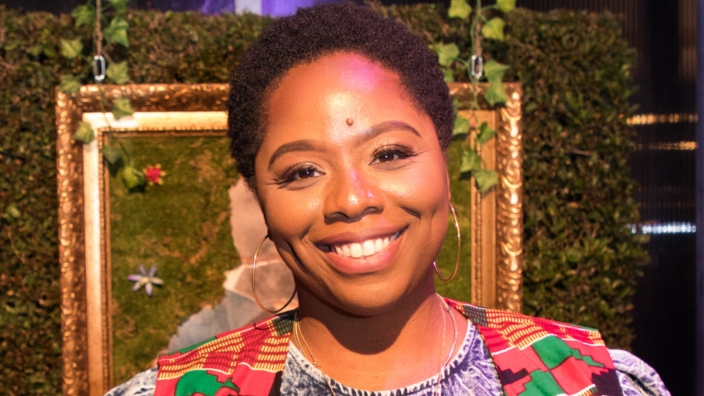Recent reports about the $6 million Southern California compound purchased by the Black Lives Matter Global Network Foundation raised eyebrows among the organization’s supporters and served as fodder for flames lit by its detractors.
The 6,500-square-foot Studio City home features seven bedrooms and seven bathrooms, a sound stage, music studio, pool and parking for more than 20 cars. It was purchased in October 2020 with the support of Dyane Pascall, a Black real estate expert, and bought after the organization received a $90 million windfall in the wake of Minneapolis Police officers’ murder of George Floyd in May 2020.

In a roundtable with members of the Black press, Black Lives Matter co-founder Patrisse Cullors, former head of the Black Lives Matter Global Network Foundation, addressed the purchase of the home and how reports about it have impacted their security and that of the organization.
Cullors began her remarks by clarifying the three arms of the Black Lives Matter ecosystem. “There are three organizations,” she contended. “There’s Black Lives Matter Global Network Foundation, which I’m the former executive director of; there’s a Black Lives Matter pack, which endorses candidates and policy. And then there’s BLM grassroots that was really founded from the chapters.”
She says that it’s important that people understand the differences between the three entities, “as they have different operations and different goals. Same goal. For Black liberation, but different takes on that.”
In addressing the acquisition of the property, Cullors said, “It’s really important for folks to understand that the acquiring of the multi-purpose property happened in October of 2020. For us, it was a huge accomplishment. And I’m speaking specifically to Black Lives Matter Global Network Foundation.” She added that “despite what has been reported, BLM has not been financially solvent.”
Cullors acknowledged that the financial windfall the organization received in 2020 was the most it ever had; previous operating costs and expenses, she noted, came from small, individual donors.
With the money that came in, she maintained, “it was really important for us to do a number of things — one, get that money to the ground and get those resources to the ground, which we did, but also secure a space like so many other organizations, not just across Black movement, but across nonprofit organizations do.”
With Pascale’s help, BLMGNF found and purchased the compound, on which they then began renovations. Cullors said that immediately after the purchase, senior members of the organization received death threats, including herself. She says she was contacted by the FBI about a credible threat to her life and that she stayed at the compound for four nights during that investigation. She said she’s not been back in nearly a year.
“Securing a Black space is neither a crime nor a hustle that is really important for you all to understand,” Cullors said, “especially as there’s a long legacy of Black people securing and wanting to secure land and property, especially when it comes to organizations. We want to see Black Lives Matter exist for a very long time; we want to see the legacy of it exist for a very long time. And there’s so many other legacy organizations that have their own buildings. And because it’s a part of that legacy.”
Also on the call was Melina Abdullah, who heads up BLM in Los Angeles. She explained how reports about the house have resulted in increased threats to the safety of her and her children. She shared that the organization has issued dozens of grants nationwide and prioritized giving money to families financially impacted by the coronavirus pandemic who had also been affected by police violence.
Closing the call was Angela Davis, the legendary freedom fighter and professor, who addressed what she called “attacks” on Black Lives Matter, calling them predictable.
“I personally knew from the outset, from the time Black Lives Matter was created, that there would be attacks similar to the historical attacks launched against Black leaders,” Davis said. “You know, particularly when we saw the FBI come up with this notion of black identity extremists. This was a sign that there was continuity with COINTELPRO. I can’t say that I would have predicted exactly how these attacks would express themselves. But I was convinced that they would happen.”
“And I think that now we’re experiencing attacks that have been consolidated,” she added, “not only on the on the right-wing, but within liberal circles as well that are designed to cause people who have supported the end to question their support.”
“I think the other, the most important point is that those media sources … have attempted to create the impression that Black Lives Matter is not interested in creating and helping to create the possibilities for a better world.” Davis continued. “It’s not interested in abolishing the institutions of violence and racism that have caused so much pain and suffering over so many decades and centuries, but rather, is only interested in self-aggrandizement. And that makes no sense at all.”
“However, we know that media strategies and other strategies have become far more effective,” Davis noted, “and particularly given the place of social media and communications environment, it is possible to create the impression that the organization that we in the movement, that we admire and with which we have associated ourselves, is only consisting of people who want to create more wealth for themselves — and that is absolutely ridiculous.”
TheGrio is FREE on your TV via Apple TV, Amazon Fire, Roku and Android TV. Also, please download theGrio mobile apps today!
Source link
 Black America Breaking News for the African American Community
Black America Breaking News for the African American Community


